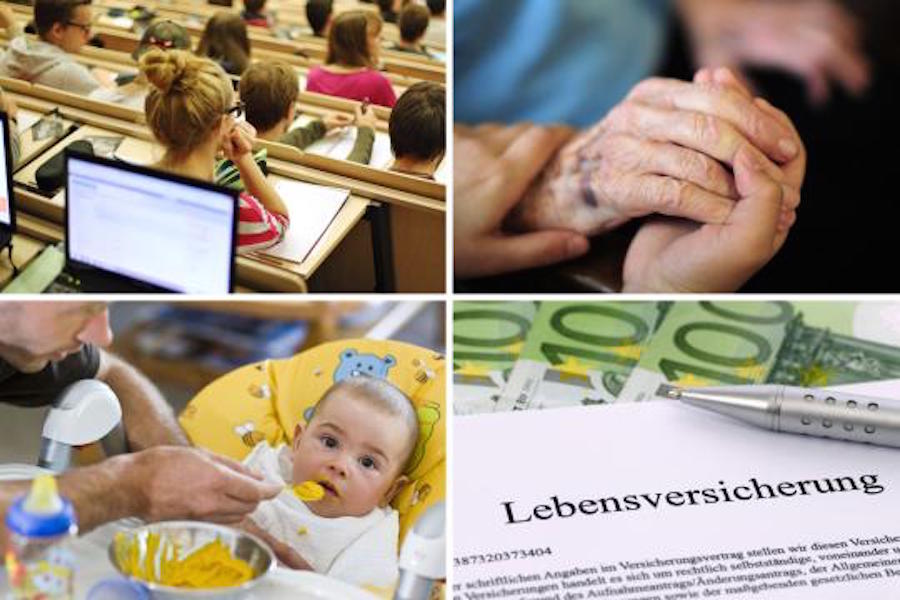
Happy New Year, I know it’s almost three weeks late, but hey this is Njaanuary, we still have another 800 days before it ends so, I’m not too late. 😆
Kama kawa, new year, new laws. We still have no government but hopefully by end of this very long month, they’ll have decided who wants to rule. In the meantime, here are new regulations to look out for.
Contents
Labour Laws
Wage Transparency
For employees in companies with more than 200 employees, you’ll now be allowed to ask for a comparison between wages paid to male and female colleagues.
Maternity protection for students and apprentices (Auszubildende)
From 1 January 2018, the Maternity Protection Act (Mutterschutzgesetz, MuSchG) will also apply to female students and Azubis. The law includes protection against dismissal and the design of workplaces and conditions for pregnant women.
Social Security
Higher Kindergeld
For parents with kids, here’s some good news. Kindergeld will increase by two euros. Those with one or two children, will be getting 194 euros per child.
Higher Kinderfreibetrag
The Unterhaltshöchstbetrag from 8,820 euros to 9,000 euros.
In addition, the child allowance is raised by 72 euros and is now at 4,788 euros (previously: 4,716 euros). The basic allowance is raised from 8,820 euros to 9,000 euros (ie by 180 euros).
Higher Pension payout
Pensioners also get something to celebrate, with a 3% increase in pension payouts. The only prerequisite is that the salaries continue developing as predicted.
Increased Hartz IV rates
Even welfare recipients have something to celebrate. This month the Hartz IV rates increase by 7 euros for single parents, 6 euros for couples. For youth and kids, it will increase by 5 euros to receive 316 and 296 euros respectively. For kids below 6 years old it will increase by 3 euros to 240 euros.
Tax Laws
Lower Pension Deductions
Your net income will be increasing from this month, with the reduction of the monthly pension deductions. The contribution to the statutory pension insurance (Rentenversicherung) will from this month fall by 0.1 percentage points to 18.6 percent. This is however expected to increase again in 2022.
Contributions for health insurance companies decline
The average additional contribution of the statutory health insurance companies will fall in 2018 from 1.1 to 1.0 percent. The additional contribution is paid by the insured persons themselves.
Tax return: limit for “low value assets” increases significantly
Expenses for professionally used objects can be claimed for tax purposes. So far, the limit for these “low-value assets” was set at 410 euros, anything more expensive had to be amortized over several years. From January 2018, items up to a net amount of € 800 (€ 952 gross) can be claimed in full in the tax return (Steuererklärung) directly in the year of purchase or manufacture.
Tax return: Receipts to be handed in on demand
The filing of the tax return will now be easier – at least as far as the submission of documents goes. From 2018 on, it will be sufficient to hand in your tax return without the supporting documents, only to hand them in when asked to do so.
Tax return: New Deadlines
If you’re planning to hand in your tax returns this year, the deadline has been moved to 1st July and if you are using a Steuerberater, then the deadline is 28th or 29th of February of the next year.
Higher motor vehicle taxes (KfZ Steuer)
Whoever is planning to buy a new car, should do so before September 1, 2018, because after that, theKfZ Steuer for newly registered vehicles will be higher because of the new emissions test WLTP. Nothing changes for already registered vehicles.
Consumer Laws
Bye bye 500 euro note
The largest note of the common currency, namely the 500 Euro bill, will no longer be printed and will not be issued at the end of the year.
Alcohol ban at Deutsche Bahn
On regional routes in northern Germany prevails in trains of the German course from 2018 alcohol prohibition. First, passengers should only be warned that in the long term, a fine will be imposed if someone violates the regulation.
Limitless online streaming in the EU
In the case of online subscription services, so-called geo-blocking will no longer apply from this year on. According to the NRW consumer association, paid streaming services for films, music or video games will from 20 March 2018 be available in all other EU countries without the providers charging additional fees allowed. So if you pay for Netflix in Germany, when you go on vacation in France, you won’t need a different account nor need to pay an extra fee to use the service.
No more surcharges when paying by credit card
For credit card payments for bookings such as hotels and purchases via the Internet, retailers may no longer charge separate fees in the future. This is stipulated by the new EU Payment Services Directive, which must be transposed into German law by mid-January, explains the NRW Consumer Center.
Already booked trips can be significantly more expensive
For those that book their holidays early to avoid higher last minute fees, well not anymore. From July 2018, tours organizer will be allowed to increase the price by up to 8% and up to 20 days before departure.
In case something goes wrong during a trip, travellers will be allowed to assert their claims up to two years after a trip.
More protection against Ping-Calls Scams
Ping-Calls Scams are whereby scammers “flash” your phone constantly hoping you call them back. at first glance, the number used looks like a German number, but once you call, it’s actually an international call that costs you a lot of money.
Now the Federal Network Agency (Bundesnetzagentur), has ordered all mobile service providers by 15th January 2018 to include a free announcement informing callers about the cost of calls made abroad. This will give callers a chance to hang up before incurring costs. Currently the service will be available for 22 countries.
Storage of From foreign air traveler Data
From May 2018, the Federal Criminal Police Office (BKA) will store data such as name, seat, flight number and IP address of all foreign passengers for five years










